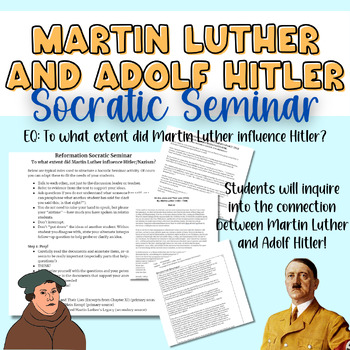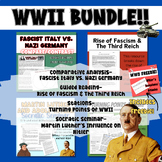Socratic Seminar: Martin Luther & Adolf Hitler
- Google Drive™ folder

Also included in
- Transform your World War II unit into an immersive and enlightening experience with this comprehensive bundle of resources. Designed for middle and high school classrooms, this bundle combines guided readings, interactive stations, graphic organizers, and comparative analysis activities to deepen stPrice $11.65Original Price $12.95Save $1.30
Description
This Socratic Seminar is focused on the essential question: To what extent did Martin Luther influence Hitler? This is really surprising for students after discussing the Protestant Reformation. I like to go over that topic and then drop this "bomb" on them that Martin Luther was a known antisemite. I have gathered 3 documents that I believe help students formulate their own opinions on the EQ while also staying engaged!
Document A- Excerpts from Martin Luther's "On Jews and Their Lies" Chapter XI
- “First, to set fire to their synagogues or schools and to bury and cover with dirt whatever will not burn, so that no man will ever again see a stone or cinder of them. This is to be done in honor of our Lord and of Christendom, so that God might see that we are Christians, and do not condone or knowingly tolerate such public lying, cursing, and blaspheming of his Son and of his Christians.”
Document B- Excerpts from Adolf Hitler's "Mein Kampf"
- “...great men have suffered at the hands of their contemporaries. Their lives and their work are then studied with touching and grateful admiration. Especially in dark days of distress, such men have the power of healing broken hearts and elevating the despairing spirit of a people. To this group belong not only the genuinely great statesmen but all the great reformers as well. Beside Frederick the Great we have such men as Martin Luther...”
Document C- Article "The Nazi's Exploited Martin Luther's Legacy"
- “In 1938, Hitler’s propagandists highlighted the fact that the infamous Kristallnacht (Night of Broken Glass) of Nov. 9-10 — when Nazis burned synagogues and smashed the windows of Jewish-owned shops, leaving more than 1,000 synagogues ablaze or smoldering — fell on the reformer’s birthday”
Includes:
- Documents
- Socratic Seminar Basic Rules
- Prep process for students
- Potential questions
- Grading Expectations and Rubric
- Teachers Guide
You can fully edit all of these materials, so feel free to take away and add whatever you would like! This can also easily be turned into a DBQ instead of a Socratic Seminar!
Timing all depends on your students. If you choose to give in class prep time, do so! If not, simply assign it for homework (this works great with an AP Euro class!). I like to give 1 in class prep day and 1 day to do that actual seminar. I have 90 minute blocks, so this takes me a total of 3hrs.
Save $$ by purchasing the WWII BUNDLE of this resource by clicking here!




